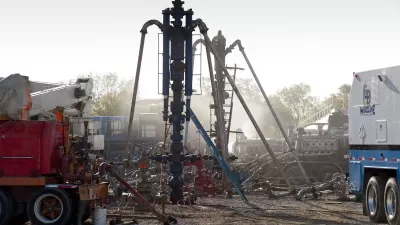Gov. Andrew Cuomo finally made a decision—make it permanent in 2015. Fracking foes won an important battle as the Empire State has massive natural gas reserves in the Marcellus shale play. In the end, health issues trumped economics.
"Gov. Andrew M. Cuomo’s administration announced on Wednesday that it would ban hydraulic fracturing in New York State because of concerns over health risks, ending years of uncertainty over the disputed method of natural gas extraction," write Jesse McKinley and Thomas Kaplan of The New York Times.
"The announcement came after a presentation by Health Commissioner Howard Zucker on the possible health risks of fracking — the results of a long-awaited report [PDF] on the subject," writes Brad Plumer, senior editor of Vox. Zucker made the initial announcement.
“As the acting health commissioner, I consider the people of New York as my patients,” he said. “We cannot afford to make a mistake. The potential risks are too great. In fact, they are not even fully known.” [BuzzFeed]
Also speaking at Gov. Andrew Cuomo's year-end cabinet meeting in Albany was New York's Department of Environmental Conservation commissioner, Joseph Martens. "Martens said a five-year study by DEC on fracking will be released next year," writes Glenn Coin of Syracuse.com. "I will then issue a legally binding findings statement prohibiting (fracking) in New York state at this time," stated Martens. [See joint press release from DEC and Department of Health.]
"Martens also talked about some of the potential negative impacts of fracking — from leaks of methane (a potent greenhouse gas that helps warm the planet) to the pollution of groundwater," adds Plumer.
Plumer notes that with this announcement, New York become "the second state to ban fracking — after Vermont did so in 2012. The difference is that Vermont's ban was mostly symbolic. New York has actual shale resources, so a ban would have a real impact."
Syracuse.com presents a sampling of opinions, from the Sierra Club to oil and gas industries, on the decision.
FULL STORY: New York State is going to ban fracking

Maui's Vacation Rental Debate Turns Ugly
Verbal attacks, misinformation campaigns and fistfights plague a high-stakes debate to convert thousands of vacation rentals into long-term housing.

Planetizen Federal Action Tracker
A weekly monitor of how Trump’s orders and actions are impacting planners and planning in America.

In Urban Planning, AI Prompting Could be the New Design Thinking
Creativity has long been key to great urban design. What if we see AI as our new creative partner?

King County Supportive Housing Program Offers Hope for Unhoused Residents
The county is taking a ‘Housing First’ approach that prioritizes getting people into housing, then offering wraparound supportive services.

Researchers Use AI to Get Clearer Picture of US Housing
Analysts are using artificial intelligence to supercharge their research by allowing them to comb through data faster. Though these AI tools can be error prone, they save time and housing researchers are optimistic about the future.

Making Shared Micromobility More Inclusive
Cities and shared mobility system operators can do more to include people with disabilities in planning and operations, per a new report.
Urban Design for Planners 1: Software Tools
This six-course series explores essential urban design concepts using open source software and equips planners with the tools they need to participate fully in the urban design process.
Planning for Universal Design
Learn the tools for implementing Universal Design in planning regulations.
planning NEXT
Appalachian Highlands Housing Partners
Mpact (founded as Rail~Volution)
City of Camden Redevelopment Agency
City of Astoria
City of Portland
City of Laramie



























